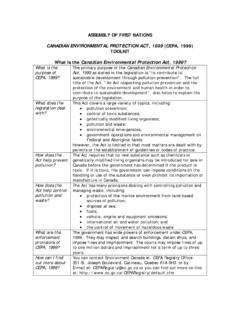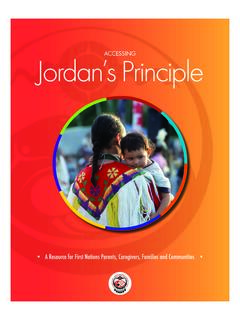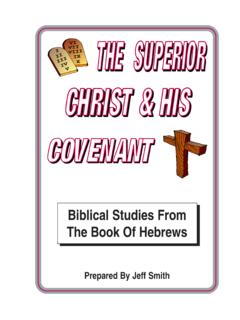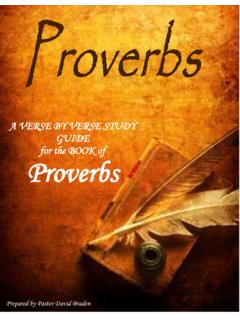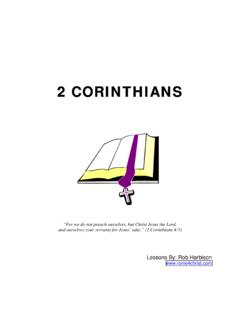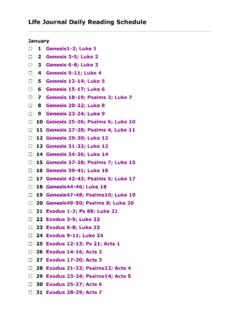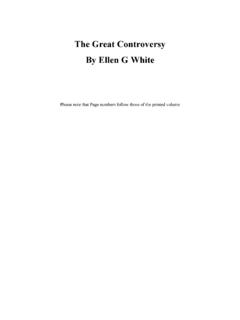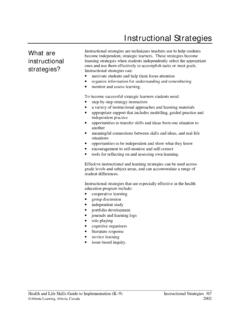Transcription of First Nations First Nations Ethics Ethics Ethics Guide ...
1 AASSSSEEMMBBLLYY OOFF FFIIRRSSTT NNAATTIIOONNSS First Nations First Nations First Nations First Nations Ethics Ethics Ethics Ethics Guide Guide Guide Guide on on on on Research Research Research Research and and and and Aboriginal Traditional KnowledgeAboriginal Traditional KnowledgeAboriginal Traditional KnowledgeAboriginal Traditional Knowledge FOR DISCUSSION PURPOSES ONLY 2 Table of Contents Introduction Purpose Draft Statement of Principles Other Considerations Other Tools Conclusion National Inventory of ATK Resources Appendix-RCAP Related Links FOR DISCUSSION PURPOSES ONLY 3 Disclaimer: The views and opinions presented in this resource booklet do not necessarily represent the position of the Assembly of First Nations or First Nations . The AFN assumes no responsibility for the content of this documents and the distribution of this resource booklet in no way implies an endorsement or recommendations of the information therein contained.
2 Introduction Contemporary interest in Aboriginal Knowledge (AK) over the past few years has brought new opportunities to explore concepts, contexts and new approaches in policy and management regimes; however, there are challenges in determining best practices and use Ethics for AK in research and application. AK is culturally, historically and community defined; it is location specific and reflects the particular conditions of unique cultures and peoples in specific geographic locations. Government, academia and First Nations have been struggling to reformulate research methods to accommodate aboriginal cultural values. The practice of integrating traditional knowledge into western scientific methods has lead to some resistance from aboriginal populations. Aboriginal people are concerned about the appropriate use and protection of their knowledge.
3 Many deem integrationist research and implementation methods as another form of colonization and exploitation, where knowledge is categorized into hierarchies and AK can be devalued, exposed, abused or used against Aboriginal empowerment to self-govern their resources. First Nations , researchers and managers face a significant challenge in creating and applying new methods that respect two fundamentally different epistemologies. Ultimately, methods must respect that it is up to the First Nations to determine if and how their ATK can be applied or not. Many First Nations would like to see a parallel ATK process created along side with science in ways that are respectful, meaningful, and appropriate. As we embark on a new paradigm shift in policy and decision making, it is essential that AK is clearly understood and a comprehensive Ethics process can lay the foundation for entry in communities.
4 It is important to create mutually respectful dialogue processes and respect ATK protocols before any measurement of success can be achieved. This resource booklet is an informative compilation of views and perspectives about the appropriate use and better understanding of the role of ATK can play in policy development. This booklet was developed to provide insightful guidance for federal and provincial governments, Provincial Territorial Organizations and First Nation governments and their community members. This document is not FOR DISCUSSION PURPOSES ONLY 4 the official position of the Assembly of First Nations , but provides a framework for interested parties for future discussions. PURPOSE What is Aboriginal Knowledge? Aboriginal Knowledge is not something that is easily defined or categorized. In a general sense, Aboriginal Knowledge is any and all knowledge that is Aboriginal in nature, content, origin, or character.
5 The term Aboriginal Knowledge is understood to describe knowledge informed by aboriginal paradigms as applied to skills, understandings, expertise, facts, familiarities, beliefs, revelations and observations. Furthermore, AK is understood to include the customary ways in which aboriginal peoples have done or continue to do certain things, as well as the new ideas or ways of doing things that have been developed by Aboriginal peoples and which respect their traditions, cultures and practices. Many of these customary ways have been passed on from generation to generation and must be considered as sacred. The Royal Commission on Aboriginal People (1996) describes indigenous knowledge as oral culture in the form of stories and myths, coded and organized by knowledge systems for interpreting information and guiding dual purpose to manage lands and resources and to affirm and reinforce one s relationship to the earth and its inhabitants.
6 It is important to note that this culturally based knowledge varies from community to community. What challenges arise when using Aboriginal Knowledge in research and management decision making? Due to fundamentally different world views, several difficulties arise when non- First Nations attempt to use Aboriginal Knowledge in research and management decision making. Western knowledge systems have evolved with the understanding that knowledge should be shared and tested. For example, the Scientific Method requires all results and data to be published. Since knowledge created or synthesized in discrete segments ( , reductionism) through western disciplines by individuals or small groups, western knowledge is often considered sole proprietary intellectual property. Western Knowledge is often created through adversarial processes in which knowledge is accepted only if it cannot be proven false ( , falsifiability).
7 Notably, research methods often are created to explain and predict results through testing and common sense is rejected ( , positivism). FOR DISCUSSION PURPOSES ONLY 5 Aboriginal Knowledge is not built on European philosophies. Aboriginal Knowledge comes from the cumulative knowledge, observations, and understandings of First Nations and has evolved since time immemorial. Since it is often sacred, it is not always meant to be shared. Aboriginal Knowledge is collective and evolving and therefore not eligible for copyrights, patents, or other forms of legal protection. Furthermore, since Aboriginal Knowledge often is used to understand the world and informs actions and practices, it is frequently based on common sense and, in western philosophical terms, would be considered largely empirical. Researchers who are unfamiliar with Aboriginal Knowledge may not follow proper protocols or traditional laws in accessing, using, or interpreting the knowledge.
8 Most First Nations consider improper access, collection, use, or interpretation of Aboriginal Knowledge an act of theft. First Nations have also experienced difficulties working with researchers who fail to understand that not all knowledge can be shared or disseminated. In the past, researchers have devalued Aboriginal Knowledge as biased, subjective, and non-empirical. Many researchers approach First Nations as research subjects instead of partners, which adds further difficulties when designing respectful research methods. Questions regarding ownership frequently arise since Aboriginal Knowledge is legally ambiguous. DRAFT STATEMENT OF PRINCIPLES Principles of the Draft Framework The following principles are suggested to address the general problems identified in the previous section. The suggested guiding principles are not adopted by AFN or any particular First Nation but are to provide the reader with general thoughts on First Nation perspectives.
9 The following principles, explained within the context of Aboriginal Knowledge use, are suggested as the basis of an Aboriginal Knowledge Protocol: Ownership, Control, Access and Possession (OCAP) A First Nation Community retains ownership and control over Aboriginal Knowledge and its interpretation. A community will have full access to any documents and research that includes its Aboriginal Knowledge Informed Consent A First Nation Community will fully be informed about the use and interpretation of its knowledge as well as the frameworks and methodologies used prior to the collection and interpretation of knowledge. The community may grant or withhold its consent for its knowledge to be accessed, disseminated, or otherwise used. FOR DISCUSSION PURPOSES ONLY 6 Partnership Researchers, Managers, and First Nation communities will work together in full partnership on research that involves Aboriginal Knowledge.
10 Academic Integrity Researchers will respect Aboriginal Knowledge and not claim Aboriginal Knowledge as their own work. Disclosure Researchers will acknowledge and disclose the origin of any Aboriginal Knowledge used or referred to in research. Researchers must disclose when an invention, result, or finding is based on Aboriginal Knowledge. Equity and Benefit Sharing The benefit of any research, invention, or finding based on Aboriginal Knowledge should be equitably shared with the First Nation community that provided the knowledge. Empowerment Aboriginal Knowledge should be accessed and used in ways that empowers First Nation communities; researchers should not seek to qualify Aboriginal Knowledge or devalue its worth or the worth of its holders. Draft Statement The following draft statement may be used when considering possible agreements between researchers and knowledge-providing communities.


